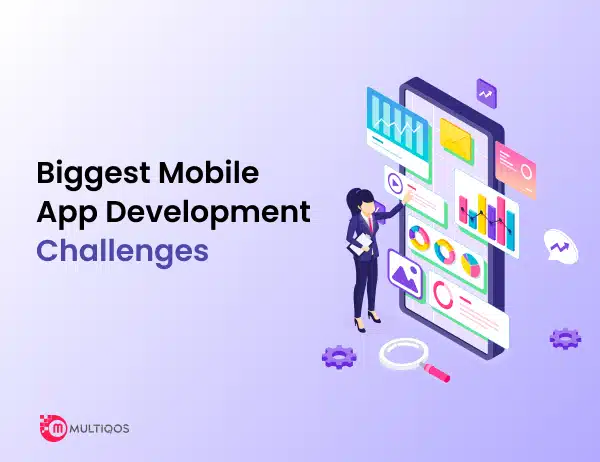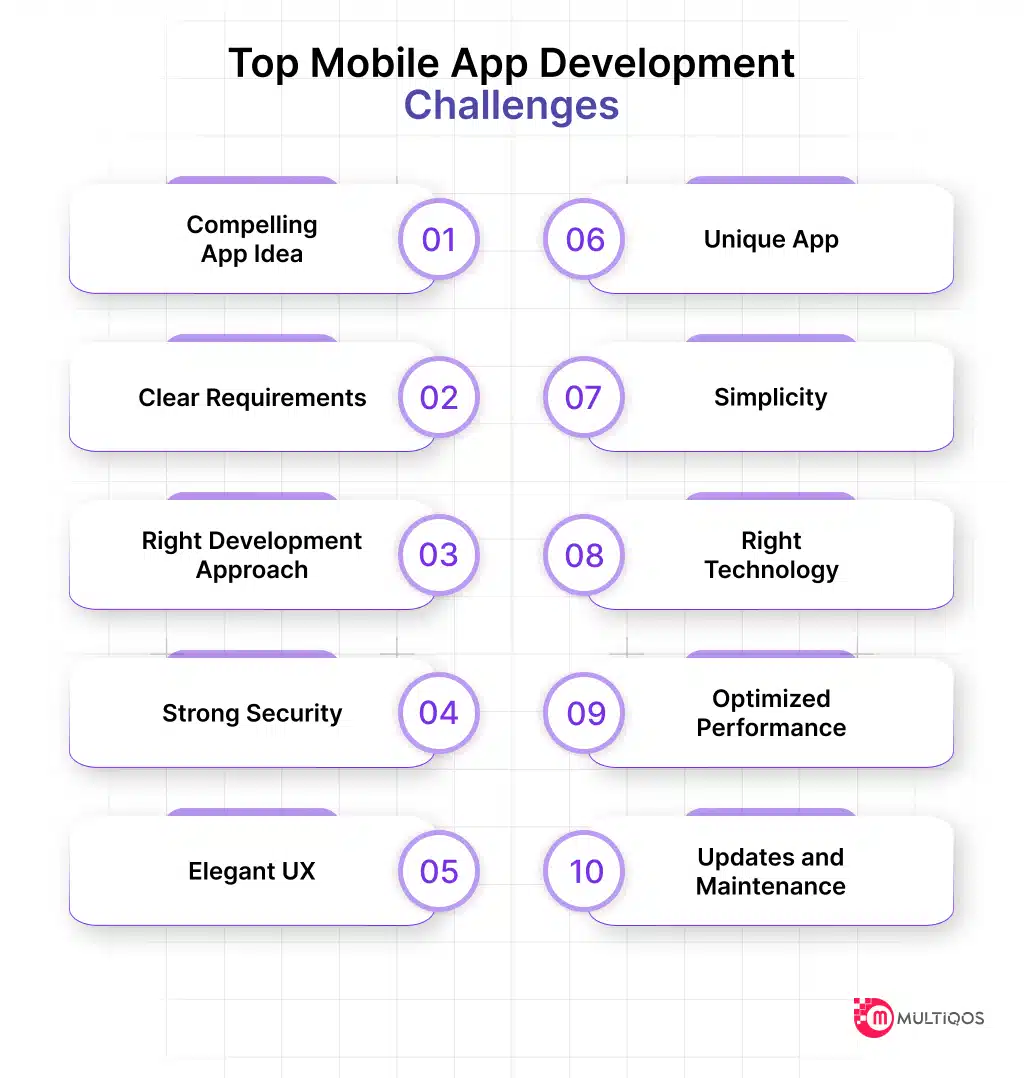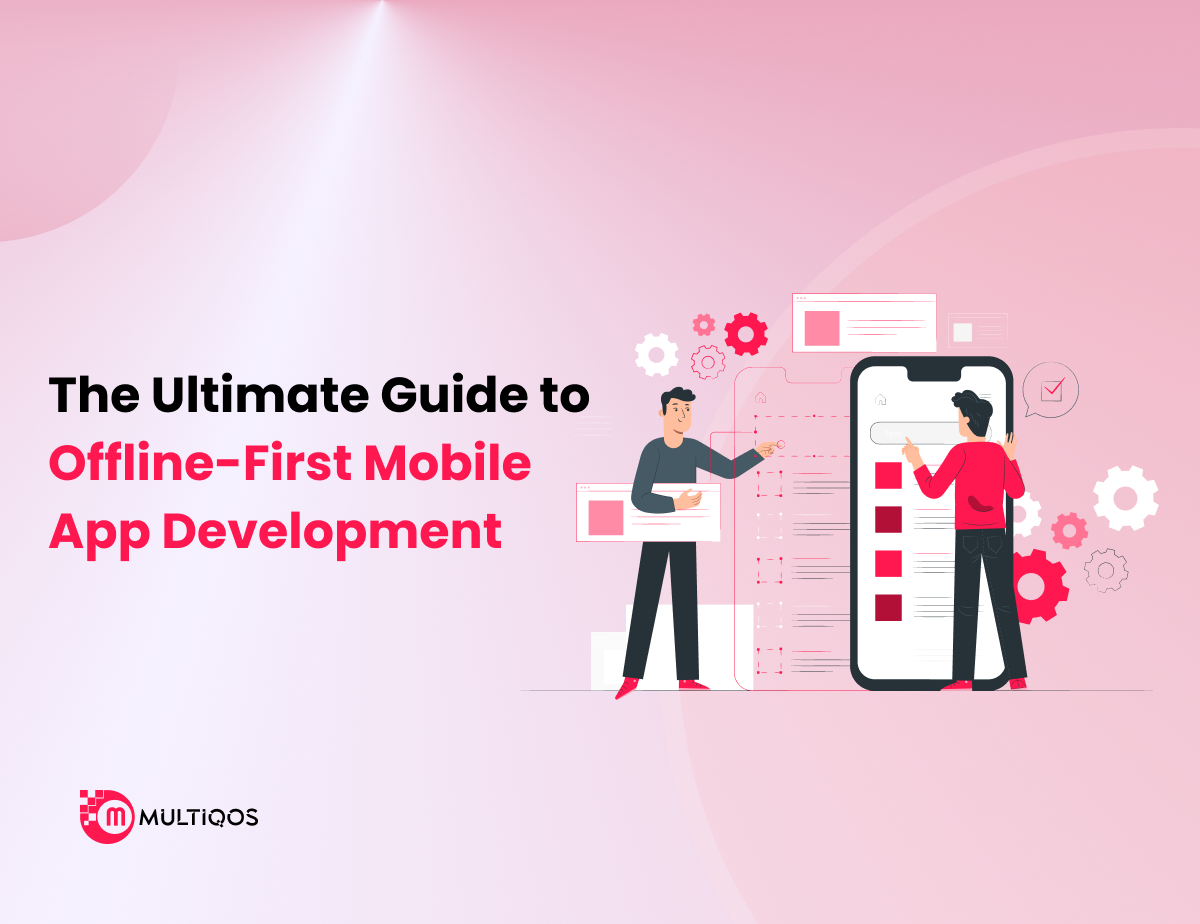
Table of Contents:
According to Statista, there are 4.3 million apps on Google Play Store and Apple App Store combined as of August 2025. This shows the popularity of apps today. Developing a mobile app is a great investment that allows entrepreneurs to get hefty earnings.
Moreover, there are a lot of challenges when it comes to creating a mobile app. Understanding these challenges is crucial to creating a successful app. These challenges are hurdles or problems that entrepreneurs have to overcome to develop a mobile app.
Top Mobile App Development Challenges in 2025
No matter what kind of mobile app you want to develop, you need to focus on numerous factors such as quality, features, user-friendliness, and more. Besides, you need to design and develop the app with the best coding practices and standards. Developing a great app takes time and you have to overcome the following challenges to make it a success.
1. Choosing a Compelling App Idea
52,000 apps were launched in February 2025 alone via the Google Play Store. So, thousands of mobile apps are released in the Play Store every month. It shows that there is a huge crowd of apps and you need to develop something that can stand out from this crowd.
It is really challenging to come out with a unique application. It is like searching for a needle in a haystack. However, considering the pain points of the target audience helps in out-of-the-box thinking. Looking for what the target audience wants to help you get the best idea for an app.
Tips for a good app idea
- Check Other Apps: You can get inspiration from other mobile apps that have been successful in the desired domain. By looking at these apps, you can understand the unique functionality that led to their successes and the pain points that you can capitalize on.
- Market Research: Understand the end users and their needs with thorough market research. It will help you discover the unique requirements of the end users that you can tackle by creating an app that fulfills those requirements.
- Better Design: Good app design will help you attract more users and make your app stand out from the other apps. Employ a design thinking methodology to come up with something that offers a next-level user experience. For example, gamification offers a great user experience that keeps users engaged. You can come up with an innovative app design.
2. Defining App Requirements Clearly
Successful mobile apps are developed when requirements are clearly defined. The challenge is involved in defining the app features, target audience, outcomes, and more. However, the changing requirements can impact the project. Additional feature requirements in the middle of the development process can affect its development time and delivery.
You must carefully assess your app requirements in the beginning to minimize the delays with changing needs. Moreover, adopting an agile approach can also help solve this problem as you can seamlessly integrate new feature requirements with an iterative development approach.
Tips to avoid scope changes
- Include All Stakeholders: Include developers, designers, and important decision makers like product managers to define requirements clearly upfront. With everyone sitting at a table, sharing their ideas, and discussing the possible requirements will help you avoid any surprises.
- Work with Prioritization: Instead of making a huge list of requirements, prioritize functions and features that are essential for your application. Don’t build everything in the start, choose features that are necessary and create iteratively.
- Work with an Agile Approach: Choosing an Agile methodology like Scrum will help you build your app successfully even if the requirement arises in the middle of the project. Since this methodology works in sprints, changes can be accommodated at any stage of the app development process.
3. Choosing the Right App Development Approach
There are different types of apps that can be developed depending on many factors like the target platform. For example, developing a native app helps you target native mobile platforms like Android or iOS. Hence,
- Native App Development
Native apps are those that are built for a specific platform instead of making it available for multiple platforms. Hence, these apps can run on specific devices. You can develop this app with the tools and languages specific to a particular mobile operating system like Android or iOS.
Now the challenges in developing an app depend on which type of platform you wish to target. For example, achieving compatibility with diverse Android devices and versions, third-party API integration, and maintaining consistent user flow are some of the challenges that you may face when developing an Android app.
Choosing a native app development approach offers numerous benefits. For example, native apps perform much faster than any other app type. Since performance is vital in user engagement, it is the best option to achieve this goal.
Plus, these apps are extremely reliable and safe. However, if you choose this app development approach, you will need to build two separate apps for both Android and iOS platforms.
- Cross-Platform App Development
This is the second type of app development approach in which an application is developed for multiple operating systems. It is a suitable app development approach if you wish to build apps to be deployed on multiple marketplaces. For example, you can build a cross-platform app that could run on both Android and iOS devices.
However, developing a cross-platform app poses its own challenges. App visibility, third-party API integration, device fragmentation, security issues, and inconsistent user flow are some of the major challenges that you have to face with cross-platform app development.
There is also a huge dependency on the framework or cross-platform technology used to develop the mobile application. It could pose stability challenges because if the underlying technology becomes outdated or is not supported by the developer it will affect the app.
Apart from this, cross-platform apps lack full hardware control like native apps. Hence, it is challenging to develop optimized features for these applications. Further, compatibility issues with various OS versions can also be a problem.
Also Read: Native vs Cross-Platform Development: What to Choose
- Hybrid App Development
Another app development approach is a hybrid mobile app development. In this approach, mobile apps are created using standard web technologies like HTML, CSS, and JavaScript. These types of applications offer higher performance than cross-platform apps.
Hybrid apps are a combination of web applications and native applications. Hence, they offer the benefits of both web apps and native apps. In simple words, hybrid applications are web apps that work inside a native application shell.
This means that a single codebase is enough to run your application on multiple mobile platforms. However, hybrid app development is not free of challenges. You need to sacrifice many great features and native user experience in favor of hybrid application development.
- Device Compatibility
One of the biggest challenges faced by app entrepreneurs is ensuring a seamless and consistent user experience across a range of mobile devices. Since mobile devices have different screen sizes and run different operating systems, it becomes challenging to develop apps that can render well on every mobile device.
Testing plays a crucial role in ensuring that applications are compatible with devices of different screen sizes. However, this is also a key challenge that entrepreneurs face when developing mobile apps. They are required to test applications on multiple devices to ensure compatibility with different screen sizes.
Often app developers reply on simulators and emulators to check device compatibility. However, testing on actual devices gives better results. Hence, including real devices in testing is essential to get the best outcomes.
4. Ensuring App Security
With the continuous rise in cybersecurity incidents, developing a highly secure app is one of the key mobile app development challenges today. It involves integrating the topmost security features and protecting users’ data through a secure architecture and design.
Mobile apps handle sensitive data and they must adhere to security standards like GDPR, HIPAA, and more. Hence, security features are quite important for mobile apps. There are many ways that you can use to minimize the potential risks and enhance app security.
Tips to build secure mobile apps:
- Data Encryption: Encrypting data is an important security feature that helps protect sensitive data from bad actors. Data encryption is a technique that encodes data into something that cannot be read or understood without decrypting it. So, attackers cannot access sensitive information.
- Use Secure Coding Practices: Secure coding is the first line of defense for mobile applications. Creating a security-first code prevents hidden loopholes that attackers use to compromise an app’s security.
- Ensure Transparency in Privacy Policy: Clearly define and communicate the privacy policy of your app with the users. Take effective measures to protect the privacy of the app user.
5. Elegant User Experience
Another key challenge that entrepreneurs have to face when it comes to developing mobile applications is creating a top-notch user experience. UI UX design is an integral part of mobile app development. It entails designing UI elements and user interactions for mobile applications.
In other words, UI UX design services focus on creating the look and feel of a mobile application. Creating a user interface that offers a flawless user experience is one of the prime objectives of mobile app development.
However, the quality of UI/UX can be affected due to technology choices, target devices, speed/user-friendliness trade-offs, and many other factors. Apart from this, the entrepreneurs need to ensure that the app meets the best usability standards.
Hence, great mobile app user experience is one of the biggest challenges that entrepreneurs have to face when it comes to creating an app.
6. Making a Unique App
With billions of mobile apps already available in the Apple App Store and Google Play Store combined, there is a huge challenge in front of entrepreneurs to build apps that stand out from the rest. Hence, you need to develop a cutting-edge mobile app that ensures visibility in the crowded marketplaces.
Once the app is developed, it needs to be promoted to attract new users and encourage them to install your application. Obviously, you need to make your app visible to the target audience to get the desired installations.
The more your app is discoverable, the more it is likely that people will download and install it. Your app can get more traction if it offers a great user experience, features, and unique benefits that no other app in the market is offering.
7. Keeping It Simple
You can add a lot of features to your mobile app to make it attractive to the target audience. But it isn’t a good option because it will affect your app’s user experience and performance. Instead, you should focus on creating a simple mobile app with a great user experience. This is another challenge that you have to face when it comes to creating a mobile app.
Creating such an app requires a simple app structure that offers a frictionless user flow. Choosing the right app architecture and features plays a crucial role in making the app simple.
8. Selecting the Technology
Another important mobile app development challenge is choosing the right technology to develop your app. It depends on various factors like the end goal of a business, type of app, category of app, and more. Hence, making a choice becomes difficult for entrepreneurs as they have to consider various aspects before developing an app.
Moreover, scalability, security, user-friendliness, and performance are the most important considerations when it comes to developing mobile apps. Hence, they need to select technologies that align with these objectives.
Further, creating a mobile application that is adaptable and versatile is also challenging. Entrepreneurs must work as per the unique requirements of businesses.
9. Performance and Optimization
The next challenge that entrepreneurs have to face when it comes to developing a mobile application is optimization. Apps must be optimized to reduce battery consumption and minimize the load on the phone’s computing resources. This will improve the app’s performance and stability.
Users like apps that consume less battery energy without affecting performance. Hence, creating such a mobile app is also challenging and requires a lot of optimizations. It requires extensive work on the coding and features to ensure optimal performance of mobile apps. Creating a beta version of the app and testing it until it has no battery issues is an approach for creating the app.
10. Managing Updates and Maintenance
Mobile apps require continuous updates and maintenance over time to ensure their quality and relevance. However, ensuring efficient maintenance and updates is a challenge of its own. Because you need to ensure maintenance and updates without affecting the user experience.
While maintenance involves fixing bugs and issues that might be hampering the performance or functionality of the app, updates involve releasing new features and security patches. They are necessary to ensure the seamless functionality of your app.
Tips for effective updates and maintenance
- Determine App Updates: Define a roadmap for app updates to streamline the process and minimize hurdles. Communicate the updates with users to keep them informed of the changes.
- Set Prioritization: Prioritize security updates and bug fixes to make sure that your mobile application is secure and stable. Promptly address critical bugs and issues to prevent users from being frustrated.
- Automate Updates: You can ensure a seamless maintenance process through automation to ensure timely updates by minimizing manual efforts.
To Wrap Up
Developing the right mobile app is half the battle you win when it comes to creating a successful business. However, developing such an app isn’t so easy and requires careful planning, research, and all-inclusive development.
You should also find out the key challenges in the process and make the right choice to succeed. We have discussed the different mobile app development challenges that you must consider when developing your app.
Understanding these challenges will help you create an infallible strategy to build your app. You can rely on MultiQoS for your app development requirements. With years of expertise and proven experience in developing mobile apps, we are a go-to choice for developing mobile apps.
Contact us for a project briefing.
Frequently Asked Questions
Choosing the right mobile app development company is essential to developing a good app. There are some important factors to consider like portfolio, experience, expertise, the way projects are managed, communication skills, and more.
Search for many companies and look for the one that has a proven record in app development. Evaluate companies based on the aforementioned factors and make a decision after proper assessment and research.
Well, the cost of developing a mobile application falls in the range of $15,000 – $250,000 or more. However, the actual cost varies depending on many factors such as the project’s complexity, app type, app category, third-party integration, and more.
The cost can increase when the complexity of an app increases. For example, the cost of developing a basic mobile app is a few thousand dollars, but those that require more customization and features cost more.
So, you must consider different factors to determine the cost of building a mobile. You can connect with us to discuss your requirements and get a precise estimate of the cost.
Get In Touch







